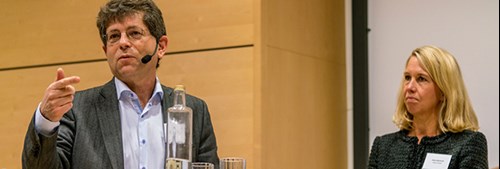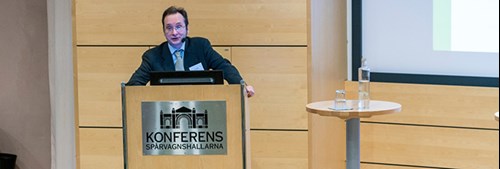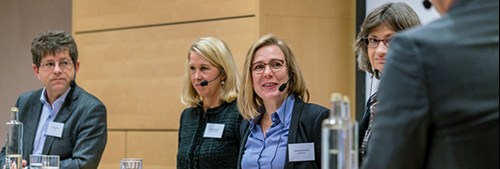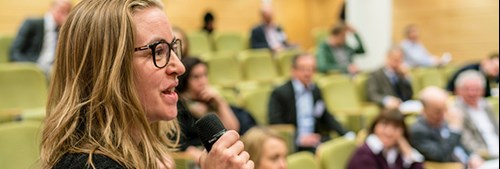Mikael Stenkula opened the seminar with a presentation of the book Entreprenörskap – vad, hur och varför (Entrepreneurship - what, how and why), authored by himself and Magnus Henrekson. Following this introduction a panel discussed everything from definitions of entrepreneurship to what the politicians need to do to facilitate for many more to become entrepreneurs. The panel included Helena Casserlöv-Kvist, Meritmind, Marie Löwegren, SKJ Centre for Entrepreneurship at Lund University, Helena Stjernholm, Industrivärden, and Magnus Henrekson, IFN. The discussion was moderated by Thomas Gür.

Helena Stjernholm, CEO of Industrivärden, presented her view of what drives entrepreneurship. Photo: Karl Gabor.
For more people to become entrepreneurs, Sweden needs to be an attractive country, said Helena Stjernholm and explained that it is essejntial to have tax laws that promote entrepreneurship. Though it is also important to have, for example, a sensible housing policy.
And, said Stjernholm, "make these changes sustainable, to hold over legislative periods!"
She emphasized that laws and regulations should be neutral for entrepreneurship regardless of what the entrepreneur wants to do with their companies. She explained that it's about a lifestyle to run a business. Some owners want to hand over to someone else, other wish to take the company further down the road.

Magnus Henrekson, IFN, is one of the authors of the book Entreprenörskap – vad, hur och varför (Studentlitteratur). Photo: Karl Gabor.
"We should create rules and have a reward system that value entrepreneurship. This is society's way of signaling that we want those who have the right inclination and aptitude to start and build businesses", said Magnus Henrekson.
He said that attitudes are influenced by society's reward system. For example, stock options do not function in a satisfactory way. He pointed out that the ambition to tax as much value creation as possible as wage income, has unfortunately influenced legislation.

Mikael Stenkula, IFN, one of the authors of the book Entreprenörskap – vad, hur och varför (Studentlitteratur). He opened the seminar with a presentation of the book. Photo: Karl Gabor.
See Mikael Stenkulas presentation (in Swedish)

In the middle is seen Helena Casserlöv-Kvist, Ceo Meritmind, who told the audience how she started her business which today has approximately 300 employees. Photo: Karl Gabor.
"Politicians should not believe that they can decide which companies that in the end will do well. No one knows. This is well expressed in the book: 4 percent of all businesses accounts for 50 percent of the growth", said Helena Casserlöv-Kvist and continued:
"Let ordinary people create a buffer of savings so that they have the ability to start up new businesses."
Helena Casserlöv-Kvist suggested stock options for start-up companies so that expertise "who help share the risk” can be hired. She explained that it is important to have incentives that make entrepreneurs continue to operate a business that they started:
"Though, we have a society that is very focused on exits and companies going abroad."
Marie Löwegren explained that many see it as exciting and just fine to be an entrepreneur but it is still not fully accepted to make money:
"We have to work on this attitude."
When asked about useful policy actions Löwegren said that the insolvency rules are important [to allow for second chances] to promote growth, as is flexibility in the labor market: “This is extremely important, in order for businesses to dare to employ people."

The seminar audience was knowledgeable and committed. In the photo Caroline Palm, The Swedish Agency for Economic and Regional Growth (Tillväxverket), is asking a question to the panel. Photo: Karl Gabor.

